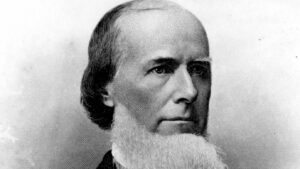SS8H7
Evaluate key political, social, and economic changes that occurred in Georgia during the New South Era.
a. Identify the ways individuals, groups, and events attempted to shape the New South; include the Bourbon Triumvirate, Henry Grady, International Cotton Expositions, and Tom Watson and the Populists.
b. Analyze how rights were denied to African Americans or Blacks through Jim Crow laws, Plessy v. Ferguson, disenfranchisement, and racial violence, including the 1906 Atlanta Riot.
c. Explain the roles of Booker T. Washington, W. E. B. DuBois, and Alonzo Herndon in advancement of the rights of African Americans or Blacks in the New South Era.
d. Examine antisemitism and the resistance to racial equality exemplified in the Leo Frank case.
Featured articles:
1893 Sea Islands Hurricane, Atlanta Compromise Speech, Atlanta Race Massacre of 1906, Auburn Avenue, Bourbon Triumvirate, Joseph E. Brown, Fiddlin’ John Carson, Chattahoochee Brick Company, Alfred H. Colquitt, Cotton Expositions in Atlanta, County Unit System, Amanda America Dickson, W. E. B. Du Bois in Georgia, Farmers’ Alliance, Rebecca Latimer Felton, Leo Frank Case, John B. Gordon, Henry W. Grady, Eliza Ann Grier, Alonzo Herndon, John Hope, Lugenia Burns Hope, Clark Howell, Sam Jones, Ku Klux Klan in the Twentieth Century, Lucy Craft Laney, Adella Hunt Logan, Lynching, Mary Latimer McLendon, Populist Party, Segregation, Hoke Smith, Spanish-American War in Georgia, Springfield Baptist Church, Sundown Towns, Thomas E. Watson







































